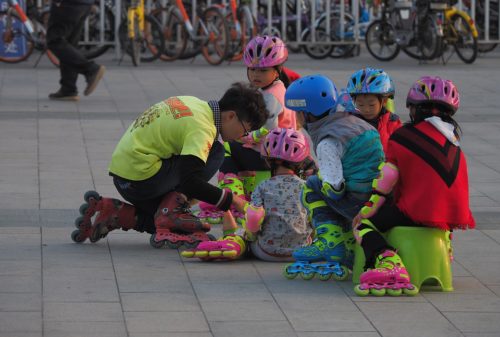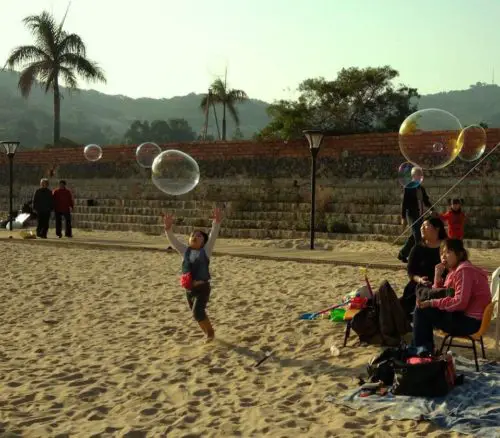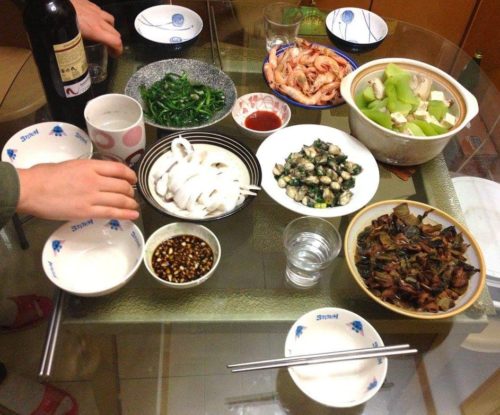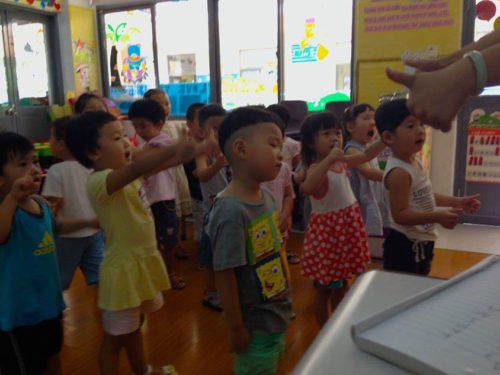Are you thinking of committing to a life of TEFL in China? Read this post to find out what it’s really like to live and work in one of the world’s most populated countries. Today, we have Annalisa to give us the lowdown of her TEFL experience.

Disclosure: Untold Wanderlust contains affiliate links. If you click on these links and make a purchase, we will earn a small commission at no extra cost to you. You can find our full disclosure policy and privacy policy here.
Country specifics
Which country are you teaching in? Why did you choose that country?
China in a city called Xiamen! I have always been passionate about eastern philosophies, and my major at the Italian public university was the Chinese language and culture. After graduation, I decided to move to China for a while to improve my Chinese.
What is required to teach English in China?
For teaching English, the majority of schools require candidates to have done a TEFL course or TESOL course, but in some cases, if you show the school manager that you have teaching experience, and he/she trusts you, you might be hired even without a TEFL certification; it depends. For teaching Italian, a Ditals certification can do.
What is the best thing about living in Xiamen, China?
I’ve found Chinese people are really easy-going and down-to-earth, especially in Xiamen City where I lived for 6 years. I never felt the pressure to conform, like I was feeling so much in my home country.

What is the worst thing about living in China?
Learning the Chinese language is a true challenge and requires you to commit a big chunk of your time to studying. Even if you don’t need Chinese for your job, you would need it in an emergency or serious situation, because the majority of the Chinese population doesn’t speak English. If you go to China without any previous knowledge of the Chinese language, you might have a hard time getting things done.
Is there a big ex-pat community? Is it easy to make friends?
Yes, there is. Making friends is very easy, but this doesn’t mean you will make long-term friends. Expat communities change consistently, people come, stay for a few months, or maybe one year, and then they go away in most cases. You can connect with ex-pats through Wechat groups, visit bars and cafes, and go to the gym.
What is the cost of living?
In the city, where I lived, Xiamen, the cost of renting an apartment depends much on the area you want to live in. Rents close to universities, the beach, and new apartment buildings with an elevator and watchmen are higher, from USD 450 to 650 for a 2-bedrooms apartment. Far away from the main attractions, you can find the same kind of apartment for USD 200. Buying groceries at the store or the street markets are very convenient, and you can fill your shopping cart with USD 25. If you eat outside, you can easily eat with USD 5. Western-style bars and cafes’ prices are similar to the ones you have at home. Foreign beer is USD 3-5 and an American coffee with cake is USD 5.

Moving abroad
How can people find TEFL jobs in China?
I found my job independently after I had already spent 4 months attending a course on the Chinese language at Xiamen University. A friend had to leave her teaching job and I took over.
How did you find your accommodation?
I contacted a real estate agency and they showed me around apartments that matched my needs.
Did you get culture shock? How did you overcome this?
Not really. I loved that the culture was so different from mine and I liked it to feel “foreigner”.
What did you do to prepare to move abroad?
I just prepared my bag and went to China to study Chinese. I became a teacher after I had lived there for one year as a language student.

In the classroom
Which grade(s) do you teach?
As an English teacher, I have taught K0-K1 little kids, while my Italian language students were attending their last two years of high school (17-18 years old).
On average how many students are in the class?
From 25 to 30.
What classroom materials and tools are available?
Most of the schools let me arrange lesson plans and source all the teaching materials. In most of the classrooms, there were toys, children’s books in Chinese and English, small tools to make music, and a piano so that an assistant was able to play music while I was singing rhymes. There were always paper, pens and books.
What is your favourite classroom game?
My favourite game is actually very simple: singing a rhyme after I make a few drawings on the whiteboard to introduce the theme of the song. I sing the song with mimics. When they are familiar with the song and the mimics, the kids might want to sing it one by one.

Do you have any funny experiences from teaching?
There was a kid that used to repeat everything that I said exactly as I said it and imitate my voice to attract my attention. He was very smart and could learn everything faster than others.
Do you have any bad experiences teaching in China?
Yes, with the teaching assistants. If they like you and their work ethic is deep, you have a good time teaching. However, some of them get bitter because there is a huge gap between your salary and theirs. They often leave the classroom and go for a walk around the school. They don’t collaborate, and you find yourself in a situation where you have to take care of 30 kids with no support.
A typical workweek
What is your work week like?
I work Monday through Friday from 8:30 am to 4:30 pm in the bilingual kindergarten. In other schools that were only Chinese with English classrooms, I used to teach 2 hours in the morning, for half an hour per class.
What do you like to do when you are not teaching?
Rest, grocery shopping and planning trips for the holidays. Teaching kids is exhausting!
Personal experiences of TEFL in China
What advice would you give to someone thinking about teaching in China?
Do not think only about the salary. The market is huge. Ask clearly how they can support you during classes. If they provide an apartment, ask them to show you pictures of the apartment they want you to live in. Ask the managers about teacher assistants. Have written clearly in the contract how many people will take care of 20-30 kids while you are performing the English class.
What is the most rewarding part of TEFL in China?
Kids learn really quickly and love you, even the “difficult ones”
Any other comments that you would like to add?
Teaching English in kindergartens in China is a very tiring job, even for energetic people.
We hope you enjoyed this interview about TEFL in China and we hope it has inspired you to take the plunge and teach abroad. If you’re sure you want to teach abroad but not sure which country, check out this post about teaching in Thailand for more TEFL inspiration!
Meet the guest blogger: Annalisa Franceschini

I’m passionate about foreign languages and cultures. I was born and bred in a big metropolis in Italy and have always wanted to travel to places with majestic landscapes and nature. I dream of getting a motorhome and exploring Europe for a long time.
You can follow her journey on Facebook or her blog; Travel Connect Experience.
Like this post? Pin it!


